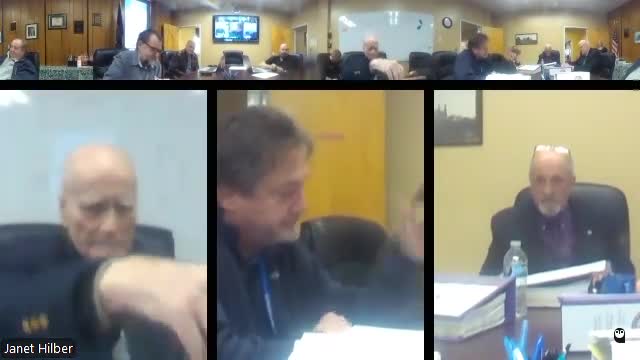Commissioners weigh budget trade-offs: nursing-home rates, ICE housing revenue and staffing pressures
Get AI-powered insights, summaries, and transcripts
Subscribe
Summary
Strafford County commissioners spent the bulk of the meeting on the upcoming budget, discussing Riverside nursing-home rates, a potential revenue stream from housing ICE detainees, jail staffing and capacity constraints, capital projects and regional dispatch and service consolidation options.
Strafford County commissioners spent the meeting’s substantive portion discussing the county operating budget, focusing on revenue uncertainty from state actions, potential federal reimbursements tied to housing Immigration and Customs Enforcement (ICE) detainees, staffing shortages in the jail and nursing home, and several capital projects.
Why it matters: Commissioners said county labor costs constitute roughly 80% of the operating budget, and rising market wages and a tight labor market create pressure to raise property-tax supported spending unless new revenues materialize. Officials identified possible federal and state revenue changes that could materially affect the county’s fiscal plan and said they must finalize a budget message for municipalities by Jan. 15.
Key budget items and staff direction - Riverside nursing home: County staff budgeted Riverside off the first six months’ anticipated rate and left the second six months flat because the county is uncertain whether the state legislature will increase nursing-home reimbursements. Commissioners discussed the possibility of rate increases but said the legislature’s actions—and committee conference outcomes—could change revenue midyear. No formal change to the budget was adopted at the meeting; staff was directed to present a final draft for approval in the first week after the new commissioners are sworn in.
- ICE detainee housing as revenue source: Commissioners and corrections staff discussed a federal initiative to prioritize deportation of certain noncitizens and noted that ICE has indicated willingness to increase daily detainee rates for local host facilities. County corrections leaders said the county currently houses ICE detainees and can expand capacity with notice, but exact capacity depends on the mix of security classifications and protected-custody needs. The corrections official reported the average length of stay for ICE detainees at the time of an inspection last September was about 67 days. Commissioners said the county’s budget conservatively assumes potential ICE-related revenue and projected a scenario anticipating up to $12,000,000 in total revenue if agreements and operational capacity materialize; they cautioned that this projection depends on federal policy execution and intergovernmental arrangements.
- Jail staffing and capacity: County corrections staff described staffing shortages, mandatory overtime and a burned-out workforce after COVID-era pressures. The county’s classification and housing adjustments provide flexibility, but officials said they need more staff to safely accept and supervise additional detainees. Commissioners acknowledged that recruiting and paying market wages are necessary to stabilize operations and that increased wages and overtime drive substantial portions of the proposed spending increases.
- Capital projects and facilities work: Facilities staff reported progress on a series of capital projects including plow-truck purchases, sewer projects with vendor engagement, and an awarded roofing bid that now has a signed contract. Staff said weather and supervisor capacity constrain how many projects can run simultaneously and asked commissioners to allow staged implementation. Facilities indicated some jobs can begin within weeks once weather and contractual logistics align.
- Service consolidation and program cuts: Commissioners discussed hard choices should state funding decline, including potential elimination of services the county is not statutorily required to run (for example, certain regional programs). They noted prior regionalization proposals (dispatch consolidation, shared detective services or regional sewer plants) often face political resistance from municipalities even when regionalization would save money.
Board direction and timeline Commissioners set a budget target around a 4.01% tax-rate impact with a 3.5% CIP assumption and left a small growth allowance in revenues; they instructed staff to prepare final materials so the county and municipalities receive the budget packet by the Jan. 15 deadline. The chair and staff said they may reconvene before the swearing-in to finalize minutes and related administrative items. Commissioners also asked staff to continue checking with ICE and federal partners on rate and timing for detainee housing and to bring back any changes that would materially affect the proposed tax rate.
Provenance: The conversation began when the chair moved from earlier items to the budget and continued through an extended discussion with the county administrator, corrections leadership, and facilities staff. No formal budget vote took place at the meeting; commissioners agreed to return with a final draft for approval after the swearing-in.
